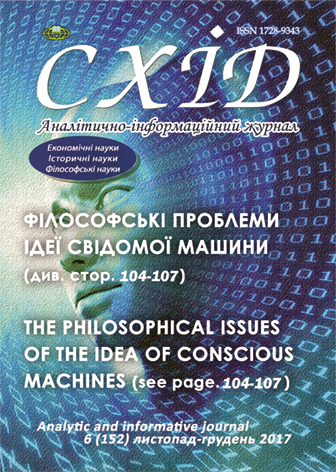Religious motifs of the semantic core of Soviet identity
DOI:
https://doi.org/10.21847/1728-9343.2017.6(152).122356Keywords:
"Atheism", "Soviet religiosity", "Scientific atheism", "Limit values", "Russian world", "identity", "anti-religious propaganda"Abstract
In the article the author explores the religious motives of the semantic core of Soviet identity and suggests that Soviet atheism is viewed as a form of religion. It is justified that the creation of the USSR was accompanied by the construction of a cultural tradition that met the needs of different peoples; requirements for "Soviet culture and Soviet man" were formulated. This cultural tradition, realized in Soviet practice, is proposed to be understood as a new articulation of the "Russian idea". A characteristic tool for its implementation was atheistic ideology. It is shown that the Soviet state aspired to become the only source of answers to the fundamental questions "Who are we?", "What are we building?" And "How to achieve this?" And the first thing to replace in this plane is the church. The author considers a set of actions that have tried to achieve this goal, namely: first, anti-religious propaganda, persecution of religious figures and the destruction of temples; secondly, the replacement of religious holidays with secular ones; thirdly, the role of the leader in the formation of Soviet atheistic religion, as the absolute and creator of finite meanings. In this way, a certain symbolic world was formed and encoded in a form understandable to many, which is not difficult to inherit. These practices were the necessary efforts of subsequent generations that preserved the collective identity and established its continuity through sacred action. Such actions are similar to the practices of repeating the creation of the world in primitive peoples. The vast majority of Soviet rituals and practices continue to be preserved and supplemented in modern Russia of the XXI century. Constantly reproducing an existentially marginal situation, the state affects the key need of its citizens in global security.Downloads
References
Hurzhy, V. S. (2017). The ideologues of the «Russian measure» in modern hybrid wars In: Hybrid War: in verbo et in praxi. LLC «NilanLTD», Vinnytsa, 412 p. (ukr).
Lukman, T. (1977). Filosofiya, science and everyday life. In: Nature of philosophical knowledge. Part II. Modern phenomenology: state and perspectives (critical analysis) [translat.]. Vol. 2“Abstract compilation”. Moscow, 262 p. (rus).
Van den Bercken, William (1985). Ideology and atheism in the Soviet union. Religion in Communist Lands. Vol. 13, Iss. 3, 269-281. DOI: 10.1080/09637498508431208
Ryklin, M. (2009). Communism as a Religion: Intellectuals and the October Revolution. New literary education. Moscow, 136 p. (rus).
Eliade, Mircea (2002). Histoire des croyances et des idees religieuses. TomeI.De l’age de la pierre aux mystere d’Eleusis [Translat.], Catherion, Moscow, available at: http://psylib.ukrweb.net/books/eliad02/index.htm.
Benyamin, V. (2014). Moscow Diary [translat.]. Garage; Ad Marginem, Moscow, 264 pp. Available at: http://www.fedy-diary.ru/html/032013/0703013-03a.html
Ryklin, M. K. (1992). Terrorolohyky. Eidos, Tartu-Moscow, 224 p. (rus).
Lanovenko, O. P. [scient. ed.] (2004). XXI Century: the world between the past and the future. Culture as a System-Generating Factor in International and National Security. Stilos, Kyiv, 572 pp. (rus).
Hurzhy, V. S. (2015). The consequences of the implementation of the doctrine of the «Russian world» in Ukraine. Skhid. № 2 (134). 34-40. DOI: 10.21847/1728-9343.2015.2(134).40085.
Berdyaev, N. A. (1931). Russian religious psychology and communist atheism. Available at: http://vtoraya-literatura.com/pdf/berdyaev_russkaya_religioynaya_psikhologiya_1931.pdf
Panych, O. (2015). Scientific atheism as a cultural system. Available at: http://uars.info/prints/ur/2015_76.pdf
Froese, Paul (2004). Forced Secularization in Soviet Russia: Why an Atheistic Monopoly Failed. Journal for the Scientific Study of Religion. Volume 43, Issue 1: 35-50. DOI: 10.1111/j.1468-5906.2004.00216.x
Lotman, Yu.M. and Uspensky, B.A. (1982). Echoes of the concept «Moscow - the Third Rome» in the ideology of Peter the First. Available at: http://www.historicus.ru/otzvuki_kontseptsii_Moskva_tretii_Rim_v_ideologii_Petra_Pervogo/
Berdyaev, Nikolai (1990). The origins and meaning of Russian communism. available at: http://www.vehi.net/berdyaev/istoki/
Russell, B. (1991). Practice and the theory of Bolshevism [translat.]. Nauka, Moscow. Available at: http://antimilitary.narod.ru/antology/russel/russel_bolshevism.htm
Aron, Raymond (1957). The Opium of the Intellectuals. Doubleday & Company, Inc., New York, 203-235. Available at: http://www.ruthenia.ru/logos/number/51/10.pdf
Boyko, Y. (1957). Theory of the Third Rome in the Moscow Orthodox Church after the last war. Paris, 30 p. Available at: http://diasporiana.org.ua/wp-content/uploads/books/312/file.pdf
Eliade, M. (2016). Treatise on the history of religions [translat.] DUKHILITERA, Kyiv, 520 p. (ukr).
Gide, Andre (1990). Return fromt he USSR. The Releasing of Political Literature. Moscow. 272 p. Available at: https://royallib.com/read/gid_andre/vozvrashchenie_iz_sssr.html#0 (rus).
Downloads
Published
How to Cite
Issue
Section
License
Copyright (c) 2018 Volodymyr Hurzhy

This work is licensed under a Creative Commons Attribution-NonCommercial-NoDerivatives 4.0 International License.
1. Authors bear responsibility for the accuracy of facts, quotations, numbers and names used.
2. Manuscripts are not sent back.
3. The publisher does not always agree with the authors' opinion.
4. The authors reserve the right to authorship of the work and pass the first publication right of this work to the journal under the terms of a Creative Commons Attribution-NonCommercial-NoDerivatives 4.0 International License. This license allows others to distribute (copy) the published work for non-commercial purposes, provided there is mandatory attribution to its authors and a link to the first publication in our journal.
5. The authors have the right to conclude separate supplement agreements that relate to non-exclusive work distribution in the form in which it has been published by the journal (for example, to upload the work to the online storage of the journal or publish it as part of a monograph), provided that the reference to the first publication of the work in this journal is included.

